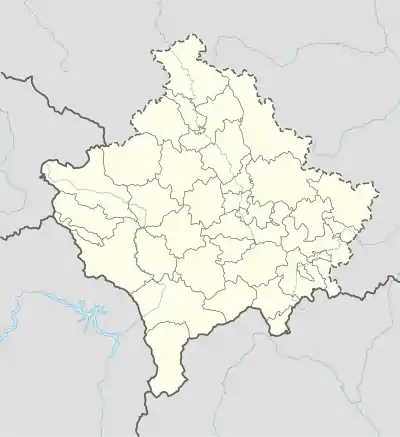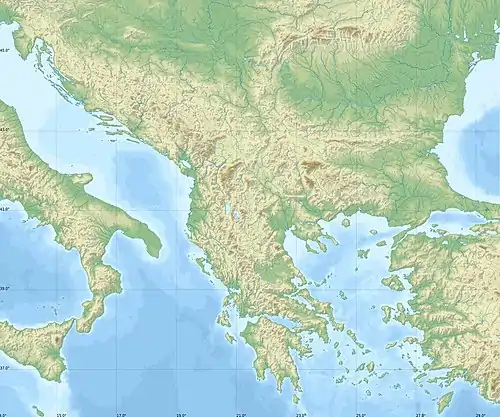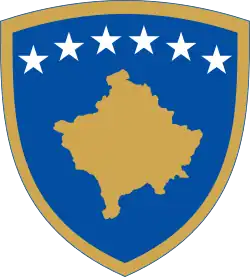Junik
| |
|---|---|
Town and municipality | |
 | |
 Emblem | |
 Junik  Junik | |
| Coordinates: 42°28′34″N 20°16′39″E / 42.47611°N 20.27750°E | |
| Country | Kosovo |
| District | District of Gjakova |
| Municipality | Junik Municipality |
| Municipality | 2008 |
| Government | |
| • Mayor | Ruzhdi Shehu (LDK) |
| Area | |
| • Total | 77.78 km2 (30.03 sq mi) |
| Elevation | 517 m (1,696 ft) |
| Population (2011) | |
| • Urban | 6,053 |
| • Municipal | 6,084 |
| Time zone | UTC1 |
| Postal code | 50000 |
| Area code | +381 390 |
| Vehicle registration | 07 |
| Website | kk |
Junik (Albanian definite form: Juniku; Serbian: Јуник, romanized: Junik) is a town and municipality in the Gjakova District in western Kosovo.
History
During the Ottoman occupation of the Balkans, Junik and the Municipality of Junik were part of the Nahiya of Altun-ili during the 15th century. In a 1485 defter of the region, Junik was mentioned with the name Lunik. In the 15th century, around half of Junik's population had typical Albanian anthroponomy. The Ottoman register from 1485 indicates that Junik was mostly inhabited by an Albanian population whom bore Albanian names mixed with Slavic and Christian[1] Junik was also recorded with 52 households in the 1485 register.[2] During the early period of Ottoman occupation, Gjakova and the Gjakova Municipality were part of the Nahiya of Altun-ili. Most of the villages in the Nahiya of Altun-ili were dominated by inhabitants with Albanian anthroponomy, which indicates that during the 15th century (as supported by Ottoman defters), the lands between Junik and Gjakova were inhabited by a dominant ethnic Albanian majority.[3]
Geography
It is located between Deçan and Gjakova along Kosovo's mountainous border with Albania. It has a convenient geographical position because it extends to the north-west of the Dukagjin plain, in front of the mouth of the Erenik river, which originates from the Gjeravica lakes and goes through the valleys of the Albanian Alps. Municipality of Junik is bordered by the Municipality of Deçan, the Municipality of Gjakova, the Republic of Albania and the Republic of Montenegro. The distance Junik-Peja is 25 km, Junik-Gjakova is 20 km, passing through the village of Batushë, while the distance from Junik to Rastavicë (Peja-Gjakova highway) is 5.5 km.
Climate
Junik has a continental climate, but with some Mediterranean features. This climate is suitable for the cultivation of various agricultural crops. The average monthly temperature is 21 °C (70 °F) in July and −11 °C (12 °F) in January.
Hydrology
The Erenik river is the largest and most important in the region, which also serves as a source of water for the irrigation of the Junik field.
Demographics
According to the 2011 census, the town of Junik has 6,053 inhabitants, while the municipality has 6,084 inhabitants. Based on the population estimates from the Kosovo Agency of Statistics in 2016, the municipality has 6,425 inhabitants. It is populated primarily with ethnic Albanians.
Notable people
- Luan Krasniqi
- Robin Krasniqi
- Din Mehmeti
- Ali Jasiqi, a writer
See also
References
- ↑ Popullsia Shqiptare e Kosoves Gjate Shekujve - Selami Pulaha p. 128-129
- ↑ Defteri i regjistrimit te Sanxhakut te Shkodres i vitit 1485 p. 163-164
- ↑ Pulaha, Selami (1984). Popullsia Shqiptare e Kosoves Gjate Shekujve XV XVI. Tirana: 8 Nëntori. pp. 83, 93, 94.
